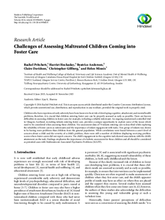Children who have experienced early adversity have been known to be at risk of developing cognitive, attachment, and mental health problems; therefore, it is crucial that children entering foster care can be properly assessed as early as possible. There are known difficulties in assessing children in foster care, for example, in finding a reliable informant. An ongoing randomised controlled trial in Glasgow, Scotland, recruiting infants entering foster care, provides a unique opportunity to explore some of the issues which need to be considered when assessing these children, including the reliability of foster parents as "informants" as to the child's development. In this article, the assessment data of 70 infants entering care is described while exploring the reliability of foster carers as informants and the importance of infant engagement with tasks.
The results show that this group of infants was shown to have more developmental problems than children from the general population. In addition, there was generally a correlation between the foster care giver's level of concern reported about the child and the severity of the child's problem (as revealed by the tests). However, there were still a number of children displaying problematic scores for whom foster carers did not report any concern about the child's development. Thus, it is important when possible to include data from multiple informants from different settings in understanding the child's developmental status and needs.

